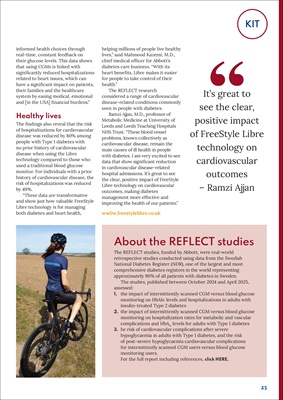
25
KIT
have a significant impact on patients,
their families and the healthcare
system by easing medical, emotional
and [in the USA] financial burdens."
Healthy lives
The findings also reveal that the risk
of hospitalizations for cardiovascular
disease was reduced by 80% among
people with Type 1 diabetes with
no prior history of cardiovascular
disease when using the Libre
technology compared to those who
used a traditional blood glucose
monitor. For individuals with a prior
history of cardiovascular disease, the
risk of hospitalizations was reduced
by 49%.
"These data are transformative
and show just how valuable FreeStyle
Libre technology is for managing
both diabetes and heart health,
helping millions of people live healthy
lives," said Mahmood Kazemi, M.D.,
chief medical officer for Abbott's
diabetes care business. "With its
heart benefits, Libre makes it easier
for people to take control of their
health."
The REFLECT research
considered a range of cardiovascular
disease-related conditions commonly
seen in people with diabetes.
Ramzi Ajjan, M.D., professor of
Metabolic Medicine at University of
Leeds and Leeds Teaching Hospitals
NHS Trust. "These blood vessel
problems, known collectively as
cardiovascular disease, remain the
main causes of ill health in people
with diabetes. I am very excited
to see data that show significant
reduction in cardiovascular diseaserelated
hospital admissions. It's great
to see the clear, positive impact
of FreeStyle Libre technology on
cardiovascular outcomes, making
diabetes management more effective
and improving the health of our
patients."
www.freestylelibre.co.uk
It's great to
see the clear,
positive impact
of FreeStyle Libre
technology on
cardiovascular
outcomes
- Ramzi Ajjan
About the REFLECT studies
The REFLECT studies, funded by Abbott, were real-world
retrospective studies conducted using data from the Swedish
National Diabetes Register (NDR), one of the largest and most
comprehensive diabetes registers in the world representing
approximately 90% of all patients with diabetes in Sweden.
The studies, published between October 2024 and April 2025,
assessed:
1. the impact of intermittently scanned CGM versus blood glucose
monitoring on HbA1c levels and hospitalizations in adults with
insulin-treated Type 2 diabetes
2. the impact of intermittently scanned CGM versus blood glucose
monitoring on hospitalization rates for metabolic and vascular
complications and HbA1c levels for adults with Type 1 diabetes
3. he risk of cardiovascular complications after severe
hypoglycaemia in adults with Type 1 diabetes, and the risk
of post-severe hypoglycaemia cardiovascular complications
for intermittently scanned CGM users versus blood glucose
monitoring users.
For the full report including references, click HERE.